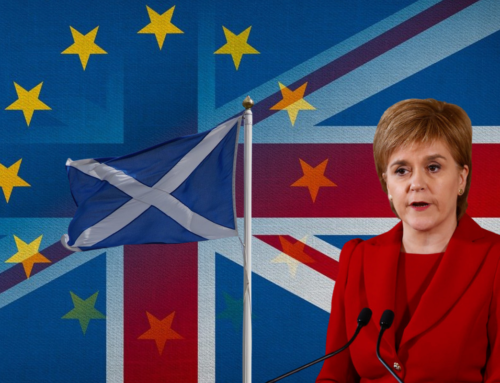
by Dr Andrew Blick
Senior Lecturer in Politics and Contemporary History at King’s College London; Senior Research Fellow at the Federal Trust
10th April 2019
Parliamentarians are seeking to exploit in the Brexit negotiations what they believe to be an incontrovertible, though normally only latent, power over the government. On Monday they passed the European Union (Withdrawal) (No. 5) Bill 2017-19, which received Royal Assent and became the European Union (Withdrawal) Act 2019. It was designed to force the government to seek an extension to Article 50, and to require parliamentary approval for the length of the delay requested by the government. The government was obliged by the Act, the day after it was passed, to table an amendable motion enabling the Commons to instruct it to seek an extension to a date of the Commons’ choosing. On Tuesday, the UK government obtained approval for its plan to seek an extension to 30 June. But is this legislation really the assertion of parliamentary authority it might seem to be?
In the United Kingdom – or perhaps that should be in England – we are brought up on a powerful myth. Parliament, so it runs, is the ultimate source of legal, political and constitutional legitimacy. Orthodox accounts of our polity hold it as axiomatic that the preservation of parliamentary ‘sovereignty’, as it is known, is essential. Thus, even though the precise meaning of this doctrine is debatable, senior decision makers go to great lengths to be seen to venerate and preserve it.
Objections to UK participation in European integration were often founded in the claim that it presented a threat to parliamentary sovereignty, through creating a legal and institutional order that took precedence over the Westminster Parliament and the legislation it produced. But the process of Brexit has proved revealing regarding the true place of parliamentary sovereignty within UK political and constitutional culture.
An inconvenient cloak
First, we have learned that, for many advocates of leaving, support for the doctrine was a matter of convenience only. After the referendum, for them Parliament became simply one more potential obstruction to Brexit. Exponents of leaving have opposed, for instance, the idea that Parliament might chose to take the referendum result of 23 June 2016 as anything other than an incontrovertible instruction to depart the EU in some form. They regarded with contempt the idea that the judiciary might uphold the sovereignty of Parliament, when it meant ruling that fresh statutory authority was needed for the government to initiate Article 50 of the Treaty on European Union, as happened in the Miller case. More recently, we have heard speculation about proroguing Parliament to facilitate Brexit or advising the monarch to withhold assent from a bill that had passed through the Commons and Lords if it was obstructive to leaving.
While Brexiteers once deployed parliamentary sovereignty and its supposed sanctity as a rhetorical device, therefore, it has now become for them an inconvenience or even a menace. Those who are less enamoured of the idea of leaving the EU – or perhaps openly opposed to doing so – have more recently attempted to utilise the supposed supremacy of the UK legislature for their purposes. They have left it late. They might have been more effective had they asserted themselves when the irresponsibly vague legislation providing for the 2016 referendum was passing through Parliament in 2015; or when, following the Miller judgement, parliamentary approval was needed for the triggering of Article 50. On both occasions, parliamentarians chose not to impose meaningful conditions.
Once Article 50 was instigated, their position became more difficult. Time was running against them, even if limited extensions might ultimately be available. Furthermore, the government was no longer seeking authority from Parliament to hold a referendum or commence a process. It was involved in a negotiation. For good practical reasons, diplomacy is conducted by ministers, normally acting with a degree of discretion. It is a matter of Royal Prerogative that, notwithstanding supposed parliamentary sovereignty, has never come under formal parliamentary control. Diplomacy, such as EU negotiations, is a government to government – not a Parliament to Parliament – activity. While Parliament can impose legal reporting and approval requirements upon the UK government, it cannot realistically impose a full negotiating position for Theresa May to take against her will. Nor can it require her to adopt a new political strategy to accompany an extension when asking for it. May, in any case, had already indicated that she was going to seek an extension up to the end of June before the 2019 Act was passed.
Shredded credibility
For these reasons it could be held that the Act has made no difference. It is arguable, however, that May might have decided to adopt this approach simply to pre-empt Parliament in imposing this decision on her. But whatever the explanation for her decision to try to secure a later exit date, the remaining EU – or rather the 27 components that make it up – will be aware that it is dealing with a Prime Minister who is either acting under duress, or, while wanting an extension, has no long term-plan to offer, or both. The EU cannot negotiate with Parliament; and even if it could, Parliament cannot fully control May. Nor can it control whoever succeeds her at No.10. The vote held to approve her extension request in the Commons on Tuesday, in which 97 of her own MPs voted against (with only 131 Conservatives voting for, of a total parliamentary party of 313) has probably undermined further such credibility as May still possessed, showing how fragile is her basis of support in the Commons.
In the event, the EU might, as is speculated, offer a longer extension (perhaps with conditions and/or allowance for an earlier termination). An earlier version of the Bill sought to provide the Commons with the ability to determine how May would respond to such a proposal. The Lords removed this provision and its amendment was agreed to by the Commons. The Act, therefore, seems to proceed on the assumption that May will accept an offer beyond the date agreed to or will return to Parliament for it to decide, as the government appears to be committed to doing. But it is conceivable May might prefer not to accept a longer extension, especially given the obvious divisions in her party over the idea.
Leaving without a deal on Friday (April 12) would then remain the default. What then would be the options for Parliament, assuming it sought to avert a no-deal Brexit? The Commons might, if asked by the government, finally vote for the exit deal in a fourth ‘meaningful vote’. Such an outcome could indeed be in the mind of the Prime Minister. It could otherwise seek to force May to accept the extension offer from the EU, assuming it remained on the table. Finally, it could try to impose a revocation of Article 50, which the UK can execute unilaterally. The attainment of any of these options, if they are possible at all, would be on a tight timetable, to say the least.
Moreover, even if an extension to the end of June or later is agreed with the EU, and if Parliament has been decisive in this episode, the Act passed on Monday cannot resolve the problem of a vacuum in UK policy. Parliament, and within it the House of Commons, will need to overcome the limitations imposed on it by party divisions and create a coalition government if it wishes to address the present emergency effectively and on its own terms. Only then might Parliament more plausibly regard itself as sovereign.







[…] but relatively soon after the formation of a Johnson government. As I have discussed elsewhere (Brexit and Parliamentary “sovereignty” and Parliament: sovereign or supine?), a Parliament that wants to prevent a no-deal Brexit, or […]